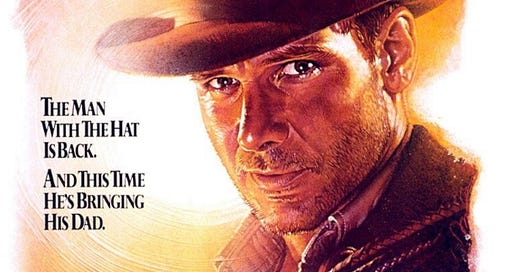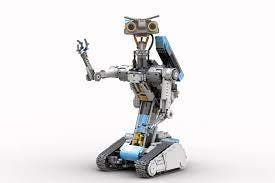I had to try it.
Truth is I’ve been playing with ChatGPT since its inception. I find it incredibly fascinating and entertaining. I’ve had it write ridiculous stories to see how it incorporates seemingly unconnected elements, instructed it to write several cover letters for job applications (it’s damn good at this - 10/10 recommend), and asked it to write a bio for children’s author Jess Rinker. (not so great at that. yet.)
We’ve been using AI technology for a long time (thank you spellcheck), but the recent uptick and attention is pretty astounding. For someone born pre-PC, and raised on sci-fi like Terminator and 1984, watching the evolution of computer capability is simultaneously terrifying and captivating. I’ve even applied and gotten into a couple coding programs because I’m so intrigued by all of this now, and it really could be a secure future for me. The only thing that has held me back is the money—I’m afraid of making the investment and then finding out my interest doesn’t match my ability.
I felt that way once before: when contemplating getting my MFA. While incredibly rewarding and edifying, and I wouldn’t take back the experience, it has not even come close to paying off financially. Neither my publishing nor teaching “careers” have reached 35,000 feet. More like hovering around 1000. I hesitate to reinvent again.
The weird part is that lately it seems like AI is going to push most of us hovering writers right out of a job. So the question is also: Do I train for a job that steals my other job?
This is getting weird.
Anyway back to my self-betrayal.
I’ve been talking a lot about how I’m self-publishing next year. One of the things you have to be really good at is writing copy for jackets and blurbs for the back cover. Also pitches, taglines, and/or other catchy marketing material that might help your book get seen. It’s the same in traditional publishing, only when your book is published with a big house they do this for you. (Thank you to all my brilliant editors!) I don’t know about other authors but I *hate* this kind of writing. At least for my books. I think I’d enjoy it quite a bit for other people’s books. But with mine I have the hardest time deciding what to include and how to make it sound more exciting than it actually is—because let’s face what this is really for. Sales. It’s like the movie poster or trailer coming before the premier. It has to drum up interest.
I love writing stories. I don’t want to have to sell it to an audience. But self-publishing requires it, so I’m trying to make peace with it. By asking AI to do it for me.
Here’s what a robot (or a robot legion?) said about my book Monolith when I fed it some key details:
In the quiet, rural landscape of Central Pennsylvania, two 13-year-olds, August Beck and Tilly Wilson, are about to embark on a summer that will change their lives forever. When August's younger brother, River, disappears while he's supposed to be watching him, it ignites a desperate search for answers that leads to an unexpected discovery in their own backyard: a monolith standing tall in the cornfield. As August grapples with the mysterious monolith and River's absence, he becomes convinced that aliens are somehow involved.
Tilly, the ambitious editor of her own community newspaper, finds herself drawn into the unfolding drama. She's determined to interview their reclusive neighbor, Mr. Starr, whose unique art created from discarded trash has always intrigued her. But now, as she helps August in his quest to find River, she begins to fear that her best friend is falling into a world of conspiracy theories rather than facing the painful possibility that River might be gone forever.
Together, August and Tilly set out on a journey to uncover the truth, even if it means confronting difficult answers. Along the way, they discover that not all mysteries can be explained by science alone. Tilly learns that sometimes it's wiser to let go of a story, while August realizes that the beauty of not knowing is a form of magic in itself. As they grapple with the enigmatic monolith, changes within their own families, and River's sudden, miraculous return, the two friends have an astonishing summer that illuminates the importance of curiosity, acceptance, and the power of the unexplained.
"MONOLITH" is a captivating coming-of-age story that blends elements of rural life, science fiction, and heartfelt emotion. In a world where the line between art and science blurs, it explores the idea that mystery itself can be a thing of beauty. Set against the backdrop of a cornfield that conceals secrets of its own, this tale is a reminder that, sometimes, the unknown is as wondrous as the truth. So join August and Tilly as they search for answers in the heart of Pennsylvania, where even in the quietest places, there may be something extraordinary waiting to be discovered.
For reference, the prompt was less than half these words.
Let’s break it down:
Completely factual. It got everything right as far as concrete details of plot and even when Robot got long-winded, it was still accurate.
Way too long for the purpose of a blurb.
Doesn’t capture a young voice which is necessary for a children’s book. Starts veering into some purple prose. But easy to edit. (also I didn’t try prompting it with a particular voice—stay tuned)
Made thematic connections I did not prompt. This is the part that impressed me. The final paragraph is especially on target with regards to how the themes of this story interact. I lightly mentioned a bit of this in the prompt, but Robot ran with it and wove it together better than I did.
Gulp.
The verdict? I might steal some of Robot’s ideas. It’s only fair.
The final copy? I think this is it. And I didn’t collaborate with AI on this one, my sister and I tossed it back and forth for a while. Humans are much more fun to brainstorm with.
When life feels too big to understand, where do you search for answers?
When August Beck is out looking for his missing brother River, the last thing he expects to find is a monolith standing in the cornfield! August is certain the monolith and River’s disappearance are connected and that aliens are to blame. But his best friend Tilly Wilson isn’t so sure.
Tilly is an expert researcher. She has to be in order to run her own community newspaper. Tilly is always chasing down a good story, like her curious neighbor Mr. Starr, who makes art out of trash, but she isn’t convinced August’s theory is true. She's afraid he's a little too obsessed with aliens and avoiding the hard truth that little River might be gone forever.
Together they search for answers and they don’t always like the explanations. Tilly learns sometimes it’s better to let a story go, and August learns sometimes embracing the unknown yields surprising results. But between the monolith, changes within their own families, and a mysterious voice in the cornfield, both friends have an astonishing summer, one that teaches them to embrace mystery and never stop asking questions.
It’s kind of a strange thing—being in charge of all of it.
But it’s also freeing and fun!





